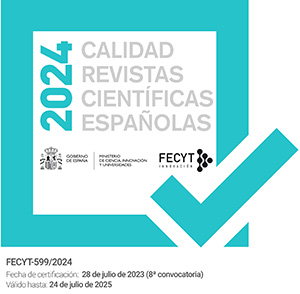CONFORMACIÓN Y EVOLUCIÓN DE UN PAISAJE EN EL ÁREA METROPOLITANA DE BILBAO, EL CASO DE GETXO
DOI:
https://doi.org/10.5944/etfvi.4-5.2011.13725Keywords:
Getxo, paisaje, paisaje cultural, abra, ría de Bilbao, landscape, cultural landscape, Estuary of BilbaoAbstract
El paisaje está adquiriendo en los últimos tiempos un creciente interés social y político. Las transformaciones del territorio debido a la evolución de las técnicas de producción y la continua expansión de la mancha urbana, han conducido cada vez más a la degradación de los paisajes, lo que hace necesaria la adopción de medidas de recuperación. El presente trabajo pretende profundizar en los métodos de análisis del paisaje, tanto a escala regional como local, desde la óptica de cómo es percibido y como resultado de la interacción de factores naturales y humanos.
Abstract.
The landscape is acquiring an increasing social interest nowadays. The changes on the territory due to the evolution of the techniques of production and the expansion of the urban sprawl have produced the devaluation of the landscapes. It is necessary to adopt measures to recover these landscapes. This study tries to explore the methods to analyze the landscape, at regional and local level, as it is perceived and as the result of the interaction of natural and human agents.
Downloads
Downloads
How to Cite
Issue
Section
License
Authors who publish in this journal agree to the following terms:
- Authors retain copyright and grant the journal right of the first publication with the work simultaneously licensed under a license Creative Commons Reconocimiento-NoComercial 4.0 Internacional that allows others to share the work with an acknowledgement of the work's authorship and initial publication in this journal.

- Authors are able to enter into separate, additional contractual arrangements for the non-exclusive distribution of the journal's published version of the work (e.g., post it to an institutional repository or publish it in a book), with an acknowledgement of its initial publication in this journal.
- Authors are permitted and encouraged to post their work online (e.g., in institutional repositories or on their website) prior to and during the submission process, as it can lead to productive exchanges, as well as to earlier and greater citation of the published work (See The Effect of Open Access).







